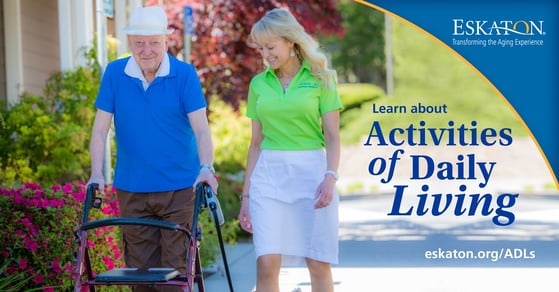Activities of Daily Living, also known as ADLs, are routine tasks people do almost every day without assistance. Although some of these tasks can become more difficult with age, it does not mean that everyone will require assistance when they grow older. However, it is good to familiarize yourself with ADLs just in case a parent or loved one needs a helping hand.

The six most common ADLs:
Bathing. As we age, getting in and out of the tub or shower can become more difficult. But when someone experiences a serious illness or injury, self-bathing can become impossible. Conditions such as paralysis from a stroke may require a person to be cleaned by towel or sponge. In other circumstances, such as a broken hip, this may only be temporary while the person recovers.
If someone is refusing to bathe, there most likely is an underlying issue that needs to be addressed. The challenge may be standing for prolonged lengths of time, and a shower chair might be an easy solution. An open wound or physical pain can also be a deterrent. However, a refusal to shower could signal a cognitive change and a doctor’s visit is necessary to further understand and diagnose the situation.
Dressing. Refusing to change clothes or put on clean clothes can also be a psychological issue, whereas not being able to reach your arms above your head or reach your feet is physical. Even buttoning a blouse or zipping trousers can become extremely difficult for someone with dexterity problems such as arthritis. Your parent may fear losing independence, but dignity doesn't need to be lost if the task is approached with loving care.
Personal Hygiene. Personal hygiene is complex because everyone is unique. Each person has a preferred way to wash, brush and style his or her hair. Most of us have morning routines that we do each day before leaving the house, which include oral hygiene. Unkempt hair or unbrushed teeth can indicate an emerging health condition or a decline in health. Someone grieving a loss may also exhibit a change in hygiene. Providing emotional support and helping the person find a new purpose can help alleviate the change in habit if it is psychological. On the other hand, a person who has experienced a heart attack or other health event may suddenly find themselves unable to complete these tasks without help.
Walking. You may have seen an older person shuffle their feet as they walk. Shuffling is sometimes the first sign of a change in mobility. Exercise is often the best prescription to fight the loss of mobility. As someone begins depending on a walker, or graduates to a wheelchair, assistance is usually required. It’s called transferring when moving a person from a wheelchair to a chair, car, toilet or bed. Transferring may require up to two people, a transfer belt and/or device. This can become extremely difficult for a family caregiver, and can be dangerous if someone doesn’t have the proper training. While the loss of mobility can signal a health issue, restricting mobility will also cause other health problems to arise, such as an increase in risk for heart disease.
Continence. It may be difficult to imagine as an adult child helping a parent on and off the toilet. When a person needs help transferring from a walker or wheel chair to a toilet, that’s when an experienced caregiver is most appreciated. Professional caregivers can be a welcome support when a loved one experiences incontinence and requires someone to change adult briefs.
Eating. We learn to eat at such a young age, and it’s one of those tasks we take for granted. A stroke survivor, someone living with Parkinson’s disease or paralysis may become dependent on another human for help with these tasks. For people with end stage Alzheimer’s disease, assistance with feeding is unavoidable. However, more than 60% of people needing help with ADLs can still feed themselves. Just because your parent needs assistance in one area doesn’t mean that will lead to complete dependence. They can still live a meaningful life enjoying the important things, such as family and friends.
Why are ADLs important to understand?
Insurance carriers may determine payments and services based on ADLs. Assisted Living Facilities may base their fees on ADLs because the amount of assistance required with ADLs usually dictates the number of people and/or caregiving hours the individual will likely need. It’s important to understand your parents’ capabilities so you are not surprised when a senior specialist begins the evaluation process. More often than not, adult children have witnessed a decline in their parents activities. Unfortunately, these signs are dismissed as a normal part of aging when they are really indicative of other issues that should be addressed.
For more information about Assisted Living: CLICK
If you have questions about ADLs, or need assistance finding a community for a family member or friend, give Eskaton a call and speak to one of our professional sales counselors who understands what you are experiencing. Click here for a list of communities.
Get to know the signs when it is time to get Mom or Dad help>

